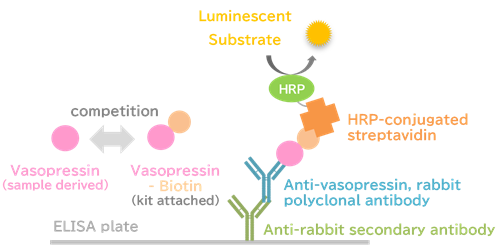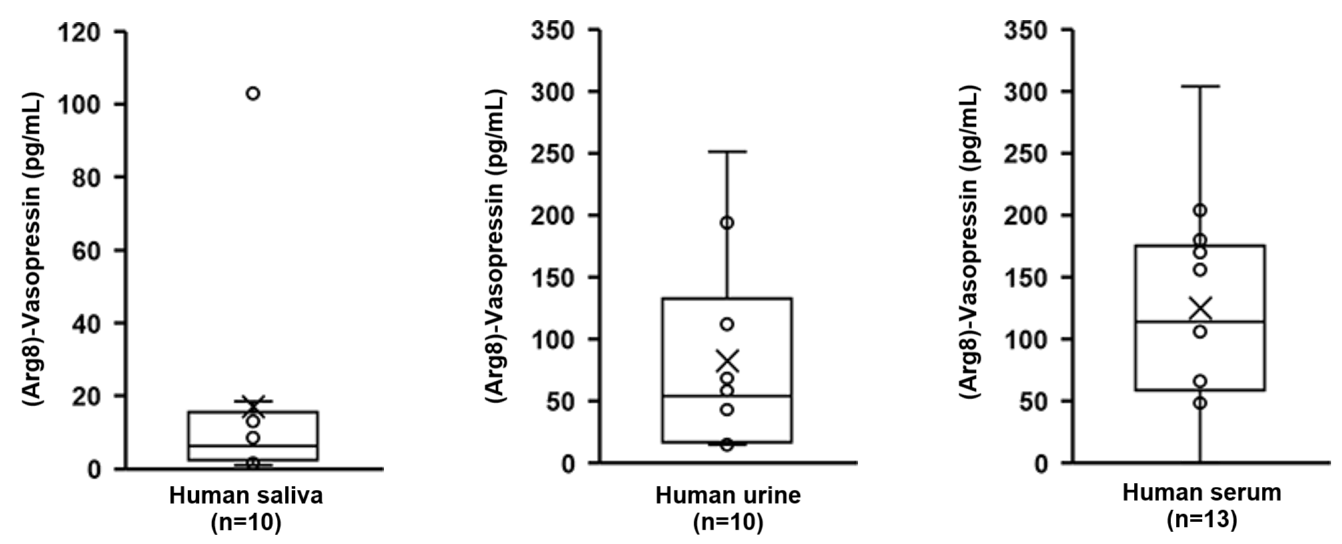Vasopressin ELISA Kits
Vasopressin is a 9-amino acid peptide hormone produced in the hypothalamus and released into the bloodstream from the posterior pituitary gland. It is well known that vasopressin is referred to as an antidiuretic hormone (ADH). Recently, it was found that vasopressin and its receptors is also widely distributed in the brain, and its function as neurotransmitter in the central nervous system has been attracting attention. Vasopressin has been reported to be involved in stress, social behavior, and learning. Furthermore, it has been linked to various psychiatric disorders such as depression, schizophrenia, eating disorders, etc. Conventionally, radioimmunoassay has been widely used to measure vasopressin. However, since it requires radioisotopes (RIs), special equipment is necessary for such measurements. ELISA kits are commercially available, but there are challenges such as the need for a large volume of sample and complicated pretreatment is required due to the abnormally high values obtained when chyle samples are measured.
What is Vasopressin?
Vasopressin is a 9-amino acid peptide hormone, and it is called (Arg8) -vasopressin (AVP) because in humans and many mammals the eighth amino acid is arginine. The amino acid sequence of vasopressin is similar to that of oxytocin, which is known to be involved in uterine contraction, milk production, and social behavior, etc. The structures of vasopressin and oxytocin differ only by two amino acids. Both are produced in the hypothalamus and released into the bloodstream from the posterior pituitary gland.
It is well known that vasopressin, a hormone, inhibits diuresis and is also referred to as an antidiuretic hormone (ADH). After being secreted into the blood, vasopressin promotes water reabsorption in the renal collecting tubules in the kidney, exhibiting an antidiuretic effect. At the molecular level, vasopressin is thought to transfer aquaporins from renal collecting tubular cells to the plasma membrane, improving water permeability and thus promoting water reabsorption1). Vasopressin has three types of receptors; V1a, V1b and V2. The V2 receptor is reported to be abundantly expressed in the kidney and involved in its antidiuretic action.
Recently, it was found that vasopressin and its receptors (V1a and V1b) is distributed in the brain, and its function as neurotransmitter has been attracting attention. Vasopressin has been reported to be involved in stress, social behavior, and learning. Interestingly, oxytocin is mainly involved in female social behavior, whereas vasopressin influences male reproductive behavior2). As an example, a study in polygamous prairie voles showed that the administration of vasopressin to male brains promoted paternal behavior and preference for a particular partner2). Furthermore, vasopressin has been linked to various psychiatric disorder (depression, schizophrenia, eating disorders, etc.), and further research on vasopressin may be useful in elucidating these disorders and developing therapeutic agents.
Conventionally, radioimmunoassay has been widely used to measure vasopressin. However, since it requires radioisotopes (RIs), special equipment is necessary for such measurements. ELISA kits are commercially available, but there are challenges such as the need for a large volume of sample and complicated pretreatment is required due to the abnormally high values obtained when chyle samples are measured.
Vasopressin ELISA Kit Wako
Vasopressin ELISA Kit Wako is designed for quantitative determination of (Arg8) -vasopressin. Compared with conventional measurement kits, this product requires less sample volume and allows highly sensitive measurement. Even for chyle samples, which have previously required complicated pretreatment, this product allows accurate measurement with simple pretreatment.
[Note]
A plate shaker and a plate reader for luminescence measurement are required since this product uses a highly sensitive competitive method
Features
- Simple pretreatment
Pretreatment can be performed simply by adding the pretreatment solution provided with the kit, followed by stirring and centrifuging. - Measurable with small sample volume
Minimum required sample volume: 50 μL (n=2) - High sensitivity measurement
Lower limit of calibration curve: 1.00 pg/mL - Less susceptible to inaccuracies caused by chyle
Even chyle samples can be measured without abnormally high values being obtained. - Radioisotope (RI)-free
No need for special equipment for RI experiment
Kit performance
| Calibration curve range | 1.00 - 2,000 pg/mL |
|---|---|
| Assay target | (Arg8) -vasopressin |
| Analysis sample | Human saliva/urine/serum/plasma (EDTA) Mouse serum/plasma (EDTA) Rat serum/plasma (EDTA) |
| Sample volume | 50μL (Measurable at n=2) |
| Measurement duration | Approx. 2.5 hours |
| Detection method | Luminescent detection (a plate reader for luminescence detection is required) |
Assay Principle
Since this product uses the principle of competitive method, as the amount of vasopressin derived from the sample becomes greater, the luminescence intensity becomes less.

Protocol
The video provides the protocol and tips for experiments using the Vasopressin ELISA Kit Wako.
【Protocol】Vasopressin ELISA Kit Wako
(Youtube 5:06)
Correlation with Conventional Product
Vasopressin in human saliva, urine, and serum was measured using this product and conventional product to determine the correlation between the measured values.

[Result]
There was a high correlation between this product and conventional product.
Effects of Chyle
Vasopressin in human serum samples was measured using this product and conventional product to determine the correlation between them. Conventional product resulted in abnormally high values being obtained for chyle samples. These values fell outside the calibration curve range. Therefore, measurement was performed again using the pretreatment method recommended by the manufacturer. The correlation of measured values was determined using all samples including (pretreated) chyle samples, or after excluding chyle samples only.

| Samples No. |
Measurement value (pg/mL) | Description | |
|---|---|---|---|
| This product | Conventional product |
||
| 1 | 51 | 292 | |
| 2 | 114 | 494 | |
| 3 | 158 | 1,086 | |
| 4 | 170 | 1,065 | |
| 5 | 0.245* | 208 | |
| 6 | 48 | 3,874 | Chyle samples ++ (pretreated) |
| 7 | 156 | 5,722 | Chyle samples +++ (pretreated) |
| 8 | 204 | 4,177 | Chyle samples +++ (pretreated) |
| 9 | 66 | 3,132 | Chyle samples ++ (pretreated) |
| 10 | 67 | 3,280 | Chyle samples ++ (pretreated) |
*Reference value
[Result]
For chyle samples, conventional product resulted in abnormally high values being obtained, with measured values tending to increase even with pretreatment. On the other hand, when this product was used, chyle had no effect on the measured values. When chyle samples were excluded, there was a high correlation between the values obtained using this product and those obtained with conventional product.
Measurement of human samples
Vasopressin in human saliva, urine, and serum was measured using this product.

References
- Nielsen, S. et al.: Proceedings of the National Academy of Sciences, 92(4), 1013(1995).
Vasopressin increases water permeability of kidney collecting duct by inducing translocation of aquaporin-CD water channels to plasma membrane - Donaldson, Z. R. and Young, L. J.: Science, 322(5903), 900(2008).
Oxytocin, vasopressin, and the neurogenetics of sociality
Product List
- Open All
- Close All
Vasopressin ELISA Kit
For research use or further manufacturing use only. Not for use in diagnostic procedures.
Product content may differ from the actual image due to minor specification changes etc.
If the revision of product standards and packaging standards has been made, there is a case where the actual product specifications and images are different.



